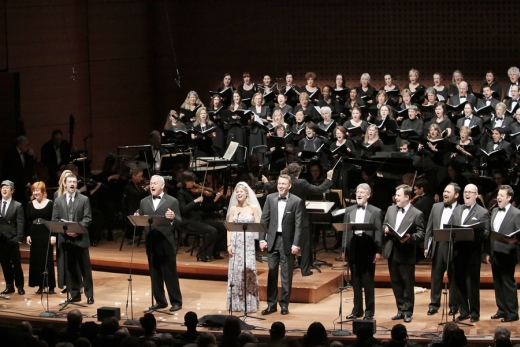Other Links
Editorial Board
- UK Editors
- Roger Jones and John Quinn
Editors for The Americas - Bruce Hodges and Jonathan Spencer Jones
European Editors - Bettina Mara and Jens F Laurson
Consulting Editor - Bill Kenny
Assistant Webmaster -Stan Metzger
Founder - Len Mullenger
Google Site Search
SEEN AND HEARD INTERNATIONAL CONCERT
Kurt Weill, Knickerbocker Holiday: Soloists,
Collegiate Chorale, American Symphony Orchestra, James Bagwell (Conductor), Ted
Sperling (Director), Alice Tully Hall, New York City, 25-01-2011 (SSM) Music by Kurt
Weill Book and
Lyrics by Maxwell Anderson Concert Script
Adaptation by Ted Sperling and Edward Barnes Main Cast Brom Broeck: Ben
Davis Tenpin: Christopher
Fitzgerald Peter Stuyvesant:
Victor Garber Tienhoven: David
Garrison Tina
Tienhoven: Kelli O'Hara Washington Irving:
Bryce Pinkham There was some
question in my mind as to whether there was any precedent in my submitting a
review of a Kurt Weill musical to Seen and Heard. In a site search, Kurt Weil’s
name appears only about half a dozen times. One is a review of his One
Touch of Venus (a rave review, by the way). Another is a piece on a
three-day festival of Weill’s music held at the Barbican Centre in January 2000, the centennial of
his birth and fiftieth anniversary of his death. Yes, this is
unquestionably a musical theater piece, but certainly not on the order of The
Addams Family, The Lion King or Mary Poppins. There is much
silliness in both the plot line and the acting, but Maxwell Anderson’s
introduction to his libretto makes it clear that this is not a lighthearted musical. Anderson writes of the play as a polemical
vehicle meant to convey his nearly anarchic beliefs. He calls government a
business that has a tendency to turn its members into gangsters, terrorists and
plunderers who then hide their evil qualities behind a facade of patriotism.
One line from the play spoken by Stuyvesant and quoted in Anderson's introduction is emblematic of his
politics: the belief that government is nothing but a protection racket
perpetrated upon its citizens by the assessing of exorbitant taxes. Anderson’s intentions are certainly not those
of a benign lyricist. Even the most innocuous melodies that Kurt Weill could
produce contain elements of Anderson's political agenda. In the song “What
is an American,” Anderson writes that a true American hates
police and the legal system for one simple reason: a true American never does
anything he is ordered to do. This
collaboration between Weill and Anderson mirrors Weill's more famous
collaboration with Bertolt Brecht. In both Brecht's and Anderson's writing,
politics peeks out from behind the curtain of their most famous operas and
musicals. Radical statements are made but in contexts and situations that hide
much of their radical rhetoric. For a new immigrant like Weill who wanted
desperately to rid himself of his German heritage and be accepted as true-blue
American, Anderson was certainly a strange bedfellow. The musical
tells the story of Peter Stuyvesant's arrival from Holland to take the position of Governor of Dutch New Amsterdam.
Everyone in the play is corrupt except the two young lovers, Brom, the Nelson
Eddy to Tina's Jeanette MacDonald. (Eddy did play the role of Brom in the 1944
film version of the musical.) Peter Stuyvesant's governorship is simply a
transfer of power from a corrupt council to a tyrant. The subplot contains elements
of the Marriage of Figaro, but certainly not the genius of either the
librettist, Da Ponte, or the composer, Mozart. Both Anderson's Tina and Da Ponte's Susanna are
being pushed into conjugal relationships with their superiors. Both plays end
with the true lovers conquering all, while their superiors learn the wickedness
of their ways. The envelope that wraps this play's plot and makes for some
ironic and amusing theater is that everything going on here is taking place in
the mind of Washington Irving. Irving,
played convincingly by Bryce Pinkham, speaks and sings directly to the audience
and, near the finale, to the actors as well. Weil's score is
a charming one, and it was sung and acted with enthusiasm and spirit. The all-professional
cast contained no weak links. For a show that had only two performances, it
certainly seemed well rehearsed: the cast handled all the lines and lyrics with
ease and confidence. The most famous tune, "September Song," could
easily have become maudlin, but was convincingly and movingly sung by Victor
Garber. Kelli O'Hara's operatic voice seemed a bit out of place; none of the
male cast members sang operatically. All of her songs might have sounded better
without the amplification that did no justice to her upper range. In fact, the
entire production would have gained in musical clarity without the amplification,
even if the audience missed a few words. The orchestra and chorus clearly
enjoyed what they were doing, and the conductor led both groups with a clear understanding
of that era's musical style. Stan
Metzger

Entire Cast of Knickerbocker Holiday
Photos by Erin Baiano
